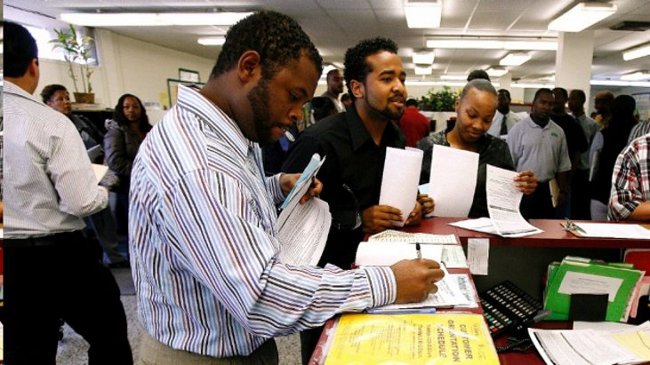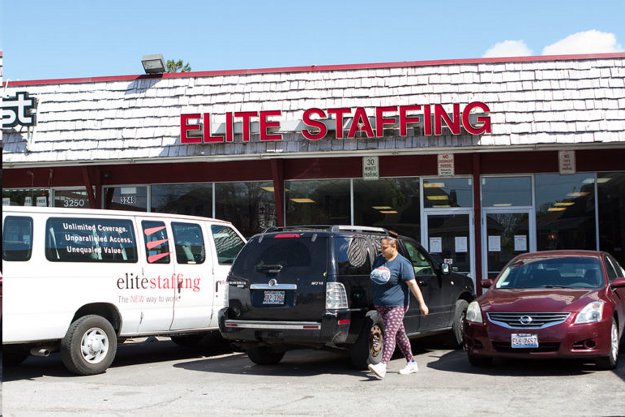Why Does the Temp Industry Shut Out Black Workers?

From the Chicago Reporter and republished by our content partner New America Media:
The code word for black workers caught Rosa Ceja by surprise.
She was working for a temp agency in spring 2014, supervising workers at a big brick packaging plant northwest of Chicago. Crews of minimum-wage temp workers in hairnets boxed consumer products such as adult diapers and energy drinks in shifts around the clock.
She knew the company wanted only men for some jobs and only women for others. And she knew those codes: “heavies” for men, “lights” for women.
But when Ceja asked the recruiting office to send more heavies, she was told there were only “guapos” available. She was confused. “Guapo” means “good-looking” in Spanish. “I'm like, ‘Who cares if he's cute?’ ” Ceja remembers saying.
Guapo, her fellow recruiters told her, meant a black worker. Black people didn’t want to work hard or get their hands dirty, they explained, so they were called the pretty ones. Latinos, the “feos” or ugly ones, were what the company wanted.
Ceja said she checked with a packing company supervisor to make sure.
“She said, ‘If you ever bring me a black guy, they’re automatically walking out,’ ” Ceja said.
Ceja had stumbled into the noxious muck of systemic discrimination in the rapidly growing temp industry. Around the country, temp agencies have used code words, symbols and gestures to illegally hire workers by sex, race and age. Whether filling orders for only white workers or only Latino ones, the tactics often hit black workers the hardest.
As Ceja underwent a crash course in this hidden system, an advocacy group called the Chicago Workers’ Collaborative was devising a counteroffensive.
The group eventually developed legislation to make temp agencies keep track of the race and gender of all job applicants.
Illinois Senate Bill 47 would provide the proof, supporters said, that temp agencies were shutting out black workers in favor of Latinos they could more easily exploit. If it passed, it could mean a fair chance at a paycheck.
Although a modest reform, it was likely the first of its kind. It put Illinois at the forefront of tackling a national problem in an increasingly important part of the workforce.
This is the story of why SB 47 was born – and how it was killed.
♦ ♦ ♦
Inside Illinois’ silvery-domed Capitol building in May 2015, Democratic Rep. Ken Dunkin was trying to guide the bill through a Labor and Commerce Committee hearing. It already had cruised through the state Senate the month before.
But a powerful Latino lawmaker pushed back, and not gently. Staffing agencies were doing a great job employing his mostly Latino constituents, he said. The exchange got heated.
“You’re hurting people in my community,” said Rep. Luis Arroyo, also a Democrat and a power player on Chicago’s Northwest Side. “You’re hurting the people that I’m putting to work in my community.”

Dunkin tried to say the bill, which would amend the Day and Temporary Labor Services Act, wasn’t just about boosting the job prospects of black workers. But Arroyo cut him off. If it wasn’t just about black workers, Arroyo argued, why weren’t any Latinos complaining about the situation?
“I don't want folks to get this twisted,” Dunkin said.
“It’s twisted already,” Arroyo shot back.
Arroyo’s district is 61 percent Latino and 4 percent black. The Chicago district Dunkin held – and lost in the March primary – is just about the opposite, at 52 percent black and 4 percent Latino.
The debate echoed the tensions between black and Latino laborers competing for minimum-wage jobs on the streets of Chicago.
It’s a dynamic playing out in cities across the country, as some employers choose Latinos for jobs black workers once often had. The clash is particularly sharp in Illinois, with one of the highest rates of black unemployment, far surpassing Latino joblessness.
And that wasn’t the only problem.
Dan Shomon, a lobbyist for an alliance of temp agencies, said the proposed law would create a paperwork nightmare costing businesses millions of dollars. Shomon is also executive director of the Staffing Services Association of Illinois, which he said represents 25 agencies that provide 250,000 jobs a year.
“We oppose discrimination also,” said Shomon, a top aide to Barack Obama during his state and U.S. Senate careers until 2006. He didn’t mention that, just one week before, a board member of his association had signed an $800,000 settlement to resolve government findings of widespread discrimination at his company. Other association members also have been hit with bias claims.
Shomon said the bill’s requirement to track the race and gender of job applicants wasn’t necessary: The federal government already collects that data, he told legislators. He had that wrong, but nobody caught the error. He repeated it a few times.
After the SB 47 hearing, Shomon took Arroyo and another bill opponent to Saputo’s, an Italian restaurant popular with politicos, spending $45 on each of them, according to lobbyist expenditure records. Asked about this, Arroyo said free meals don’t buy votes in Springfield.
“I would be a heavy, heavy individual if that was the case,” he said.
Following another hearing on the bill a few days later, the lobbyist treated Arroyo to a $50 meal at Nick & Nino’s, a “penthouse steakhouse” with 30th-floor views of the Capitol dome. By then, the bill effectively was dead.
At the second hearing, Arroyo and another lawmaker had made Dunkin promise that he wouldn’t bring it up for a final vote unless the industry lobbyist approved it.
And with that, a lobbyist who spread inaccurate information, representing companies that have faced serious allegations of discrimination, squelched what could have been a trailblazing reform.
♦ ♦ ♦
SB 47 had grown out of a larger battle over hiring discrimination in the temp industry.
The Chicago Workers’ Collaborative has been raising a ruckus for years as one of the nation’s only labor groups running a grassroots campaign to reform temp agency hiring practices. The regional office of the federal Equal Employment Opportunity Commission is among the most active in the country in suing over temp industry job bias. And a Chicago union organizer-turned-workers rights attorney has unleashed multiple class-action lawsuits against temp agencies on behalf of black workers, recently clinching a $1.5 million settlement.

The temp agency tactics aren’t lost on job seekers who show up at stark storefront recruiting offices before dawn. Some take buses across Chicago as early as 4 a.m. – not for a job they can count on, but for a chance to snag a shift making as little as $8.25 per hour.
They sit next to each other with packed lunches, in rows of plastic chairs or wooden benches. They wait for hours to see whether they will get a spot on the vans that transport temp workers to various plastics manufacturers, food factories, printing plants and packaging facilities.
For Derell Pruitt, it was bad enough watching Latino workers board the vans while black workers like him were left behind. The worst, he said, was one time last year when he actually did get sent out for a job. It was for a temp agency called Most Valuable Personnel, or MVP.
As soon as the vanload of workers arrived at the job site, a packaging plant, Pruitt said a supervisor picked all the Latinos and sent back all the black workers. They weren’t needed, they were told.
“I could not believe that they would not pick one black, not one,” said Pruitt, talking in a McDonald’s near his Waukegan home. “It was very bold and humiliating, too.”
Rosa Ceja said the same thing happened on her watch. Back when she learned that black workers were “guapos” to be avoided, she was a dispatcher for MVP, working on-site at the same packaging plant.
“Right now, if I think about it, it's really, really sad,” she said.
Another former dispatcher, Adriana Hernandez of Round Lake, has similar stories: “They would tell me, ‘Remember, the supervisor doesn’t want any older ladies, and she doesn’t want any black people.’ ” She provided a text message that she claimed showed the codes for men and women, an order for “10 lights and 4 heavys.”
In response to the allegations, an attorney for MVP, Elliot Richardson, said, “We deny that we discriminate on any basis, including race or gender or for any other reasons whatsoever.”
He declined to address specifics.
“It’s not our desire to be litigating this in the media,” Richardson said. “We have directed our clients not to speak to the media about these pending matters.”
The packaging plant, called Metropolitan Graphic Arts, or MGA, doesn’t hire by race, said its president, Greg Szymanski. If any workers were sent back, he said, it was because they didn’t want to do the job.
“We’ll hire the United Nations, and we’ll look for good workers, period,” he said.
But Szymanski acknowledged requesting male workers for certain jobs and women for others.
“If it’s picking up very heavy things, men are stronger, sure,” he said. “We’ve been in this business, and we know that men do this job better and women do this job better.”
MGA’s clients include a long list of name-brand companies that once scrolled across its website: Advil, Dove, Crest, Tide, Huggies, Tums, L’Oreal, Arm & Hammer, Target, Starbucks, Walmart and Unilever.
Pruitt is part of class-action lawsuits claiming that MVP discriminated against black workers and didn’t pay him for his time. MVP responded in court filings that Pruitt never worked for the company.
Pruitt, 40, said he had to go to counseling for his rage – against Latinos.

“I was starting to hate them,” he said. “I knew that I shouldn’t be thinking the way that I was thinking, but I was frustrated and angry.”
Pruitt said he has gone from backing Obama to full-throated support for Donald Trump, citing the Republican presidential candidate’s combative stance on immigration.
“I want to help build that wall,” he said of Trump’s plan to seal off the U.S. border with Mexico. “I want to help get rid of some of these people.”
Racial preferences loom over recruiting offices around the country, lawsuits and interviews show.
A trio of temp agencies in Tennessee, for example, systematically recruited Latinos at the expense of black workers, according to government lawsuits.
“Whether it’s low-wage Hispanic workers or low-wage African American workers, each of them are trying to make a decent living, and they’re being pitted against each other,” said Faye Williams, regional attorney for the Memphis office of the Equal Employment Opportunity Commission.
This dynamic goes back to the 1990s, when global economic competition drove employers to seek a cheaper, more flexible workforce, said Virginia Tech sociology professor Barbara Ellen Smith.
They found a solution in temp agencies, which allowed for quick and easy hiring and firing. And they found a willing workforce in a growing stream of Latino immigrants, desperate for work of any kind, she said.
“In effect, employers were replacing black workers with Latino immigrant workers,” said Smith, who studied the phenomenon among warehouse workers in Memphis. “You’ve got a population that’s really kind of exploitable.”
The ensuing conflict between black and Latino workers served employers’ interests, too: “It keeps people from organizing,” she said.
Overcoming that racial divide has been the ongoing struggle of the Chicago Workers’ Collaborative. The group, formed in 2000, traditionally advocated for Latino workers, campaigning against problems such as wage theft and sexual harassment. But a few years ago, its leaders reached out to black workers and discovered a reservoir of frustration and resentment.
“Their view was those 10 Latinos … getting in that van are the reason I’m not going to work,” said Leone Bicchieri, the group’s executive director. “As opposed to, it’s the dispatcher following orders from someone higher up.”
Black workers, he said, are more likely to complain about wage theft or workplace injuries than Latino workers, who might be worried about their immigration status or unsure of other options.
Bicchieri’s wife emigrated from Mexico and worked for years as a temp. He’s trying to convince Latino workers it’s in their long-term interests to fight job discrimination that actually favors them.
The group’s pitch is this: Black workers are losing jobs, and Latinos are losing their rights. Only united can they hold temp agencies accountable.
Read the rest here.
From the Chicago Reporter and republished by our content partner New America Media






























































































































































































































































































































